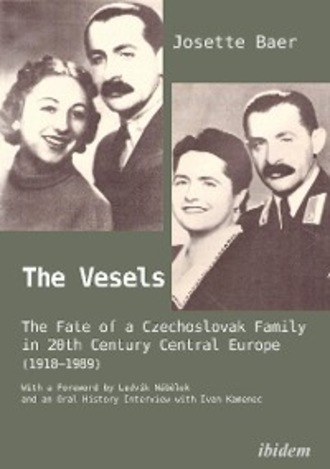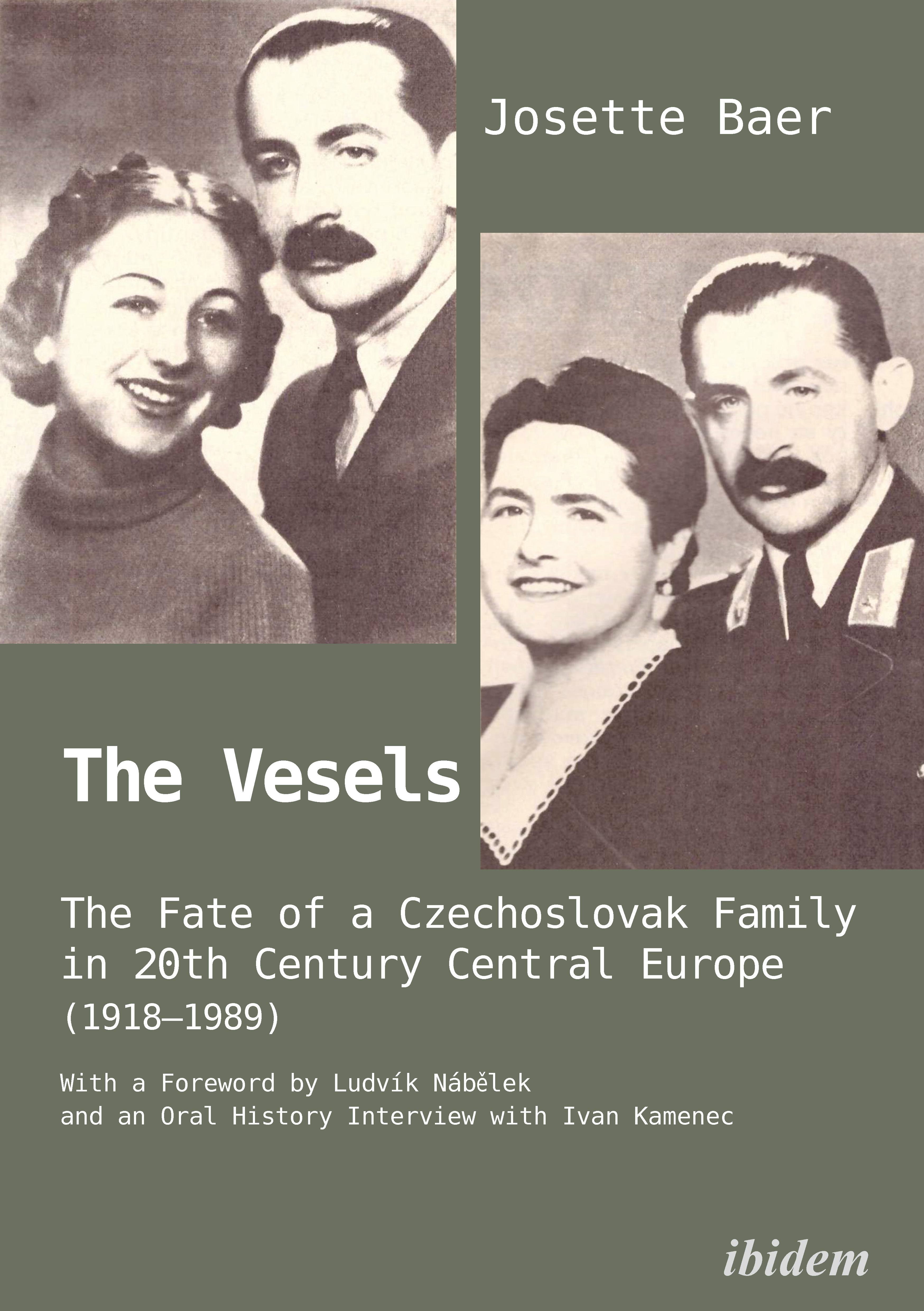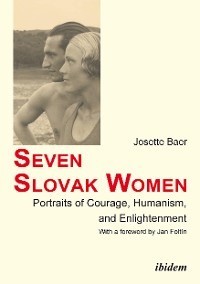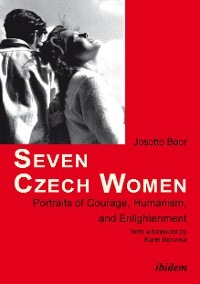
Полная версия
The Vesels: The Fate of a Czechoslovak Family in 20th Century Central Europe (1918–1989)


ERZEUGT DURCH JUTOH - BITTE REGISTRIEREN SIE SICH, UM DIESE ZEILE ZU ENTFERNEN
ibidem-Press, Stuttgart
ERZEUGT DURCH JUTOH - BITTE REGISTRIEREN SIE SICH, UM DIESE ZEILE ZU ENTFERNEN
This study is dedicated to the soldiers, officers, patriots, partisans and civilians who sacrificed their lives for liberty, fighting in the Slovak National Uprising in 1944 and on all fronts in WWII. It is dedicated to their families, men, women, children, and grandchildren.
We shall never forget.
I am most grateful to my fellow historians in Slovakia, who revealed the truth about the SNP in the short months of the Czechoslovak Spring, from 1968 to 1969, and after the Velvet Revolution of 1989, respectively. Without their analysis and academic acumen I could not have written this book.
This book is also dedicated to Jean-Marie and the cuirassiers.
ERZEUGT DURCH JUTOH - BITTE REGISTRIEREN SIE SICH, UM DIESE ZEILE ZU ENTFERNEN
Table of Contents
Foreword
Abbreviations
Acknowledgements
X. Introduction
X.1 Method, Key Contexts, Research Questions
X.1.1 Method: Contextual Biography
X.1.2 Research Questions
X.2 The ‘Victorious February of 1948’ and its Consequences for the Historiography of the SNP – Oral History Interview with Dr Ivan Kamenec, Department of History, Slovak Academy of Sciences (HÚ SAV)
I. The Vesel Family (1862–1939)
I.1 Ján Vesel – Pater Familias and Slovak Patriot (1862–1931)
I.2 The Czechoslovak Spirit of the Vesel Family
II. WWII and the SNP (1939–1944)
II.1 The Slovak State in the Context of 20th-Century Central Europe
II.2 Čatlos and Beneš – Obedience and Resistance? (1939–1943)
II.3 Preparations (1943–1944)
II.3.1 The SNR and the Christmas Treaty of 1943
II.3.2 To Arms! (29 August 1944, 1 September 1944)
II.3.3 Women in the SNP
III. After the Uprising (1945–1990)
III.1 Escape
III.2 Manual Labour and Imprisonment
Conclusion
Chronology
Bibliography
ERZEUGT DURCH JUTOH - BITTE REGISTRIEREN SIE SICH, UM DIESE ZEILE ZU ENTFERNEN
Foreword
Josette Baer’s book about my late great-uncles, the twins Mirko and Milan Vesel, is the first publication in English that deals with their activities in the Slovak National Uprising (SNP) in 1944. Baer’s study also presents an analysis of the attitude of the Vesel family – Slovak and Czechoslovak patriots in minds and hearts – towards the social and political changes that took place in Slovakia after 1938. As adherents of the democratic legacy of Masaryk and Štefánik and with the support of the members of their large family, the Vesel brothers took arms against the German occupying forces. Mirko, Milan and their youngest brother Miloš have a unique place in history as the only known example of three brothers who all became generals. As pars pro toto of the Slovak anti-Nazi resistance, they should not be forgotten, and nor should all those dedicated soldiers and partisans and their supporters amongst the civilian population who fought for freedom and justice in the Slovak mountains.
The tragic events of Slovak and Czechoslovak history are known only to a few experts, for whom it is no surprise that the momentous events of the uprising were followed by harsh years of ingratitude, marked by direct violations of the Vesels’ freedom and many hardships faced in their lives. The Vesels had a decisive influence on the course of the uprising and, with that, also the political direction and position of post-war Slovakia. And nobody will be surprised to learn that, despite everything that befell them, even in the direst moments, the Vesels never ceased to love their nation, in whose name they had sacrificed so much. It is a paradox of the years since their own lifetimes that the Vesel brothers received no acknowledgement whatsoever for what they did and what they stood for. Even today, when we are looking for personalities of Slovak history to hold up as role models for a younger generation that is often disoriented by manipulative demagogues, the Vesels do not receive due public recognition for their honourable actions and their legacy.
The Vesel family from the Zvolen and Banská Bystrica region wrote a chapter in the history of Slovakia, a chapter that can never be erased. My great-grandfather, lawyer and patriot Ján Vesel, the founder of the clan, was baptized in Radvany close to Banská Bystrica by one of the greatest Slovak poets, evangelical pastor Andrej Braxatoris-Sládkovič, the author of the collections of poems entitled Marína and Detvan. With his wife Kornélia, née Barányová, Ján Vesel brought up eleven children. In the brutal atmosphere of the Magyar assimilation and oppression of all Slavs that characterized Hungary in the last decades of the 19th and beginning of the 20th century, not only were all the children given beautiful Slovak names (Oľga, Elena, Viera, Želmíra, Mária, Ivan, Mirko, Milan, Zora, Kornélia and Miloš), they also received an education in the patriotic spirit, whose moral values would be tested by subsequent events.
Three men made the Vesel family famous; they were in the right place at the right time. Owing to their courage and indestructible faith in the forces of good, they did not hesitate when deciding what had to be done. Mirko, Milan and Miloš were officers by vocation; all three attained the military rank of general. The post-1989 democratic government of Czechoslovakia honoured Milan and Miloš with the title of general in memoriam. Not only administrative institutions but also the enemy were confused by the twins Mirko and Milan. Sometimes, it is said, not even their father could tell them apart. Their identical initials led to further confusion. To this day, there is some uncertainty about which brother is meant when M. Vesel is commemorated. In the years prior to WWII, all three brothers studied at the military academy in Hranice, Moravia – as if they sensed that the Slovak nation would soon need capable army officers. They suffered cruel fates, but perhaps this adversity was exactly what forged their characters and strong wills. Everything they accomplished was the result of their inner strength and desire to achieve something not only for themselves, but also for the nation. In the end, the stories of their lives finished in a manner which not even the best screenwriter or director could turn to more dramatic effect when portraying human destiny.
It is said that the nation is poor that has no heroes. To which we must add that a nation that does not honour its heroes is even poorer. “Boys, we have to do this!” Mirko Vesel told his brother Milan and colonel Marko on 29 August 1944 at 9.30 pm in Banská Bystrica when he learnt that the garrison of the high command of the Slovak infantry was in the hands of the pro-German officers Kanák and Zverín. This meant that General Ján Golian, who had been appointed commander of the uprising, could not arm the soldiers against the advancing German occupants. Together with my grandfather Ludvík Nábělek MD and the experienced politician Vavro Šrobár MD, the Vesel brothers became the men of the very first hour of the uprising, through a dramatic assumption of military command and the formulation of the call to arms against the Germans. The launch of the uprising was signalled by the proclamation to the Slovak soldiers and the proclamation to the Slovak nation, broadcast on 30 August 1944 by Free Slovak Radio.
On behalf of all the heroes, whom Josette Baer remembers in her principal publication, and who can no longer thank her, I express my deep and sincere gratitude.
Ludvík Nábělek MD,
Banská Bystrica, Slovak Republic
ERZEUGT DURCH JUTOH - BITTE REGISTRIEREN SIE SICH, UM DIESE ZEILE ZU ENTFERNEN
Abbreviations
Archives and libraries
ABS ÚSTRČRArchiv Bezpečnostných Složek – Ústav pro Studium Totalitních Režimů České Republiky – Archives of the State Security Services at the Institute for the Study of Totalitarian Regimes of the Czech Republic, Prague.
AÚPNArchiv Ústav Pamäti Národa, Bratislava – The National Memory Institute, Bratislava, Slovak Republic.
SNKSlovenská Národná Knižnica, Martin – The Slovak National Library, Martin, Slovak Republic.
Political parties, associations, organizations and media
CC KSČCentral Committee of the Czechoslovak Communist Party
CC KSSCentral Committee of the Slovak Communist Party
COMECONCouncil for Mutual Economic Assistance; see RVHP
CICUS Counter Intelligence Corps
CPCommunist Party
ČSAČeskoslovenská Armáda – Czechoslovak Army
DSDemokratická Strana – Slovak Democratic Party
HGHlinkova Garda – Hlinka Guards
HSĽSHlinkova Slovenská Ľudová Strana – Hlinka’s Slovak People’s Party
KGBKomitet Gosudarstvennoi Bezopasnosti – Soviet Committee for State Security
KPSSKomunističeskaia Partiia Sovetskogo Soiuza – Communist Party of the Soviet Union
KSČKomunistická Strana Československa – Communist Party of Czechoslovakia
KSSKomunistická Strana Slovenska – Slovak Communist Party
MPMember of Parliament
MNOMinisterstvo Národné Obrany – Czechoslovak Ministry of National Defense
MVMinisterstvo Vnútra – Ministry of Interior, Slovakia
NFNárodní Fronta – Czechoslovak National Front
NKVDNarodnii Kommissariat Vnutrënnikh Del – The People’s Commissariat for Internal Affairs
RVHPRada vzájomnej hospodárskej pomoci – Council for Mutual Economic Assistance
SEDSozialistische Einheitspartei Deutschlands – Socialist Unity Party of Germany
SNPSlovenské Národnie Povstanie – Slovak National Uprising
SNRSlovenská Národná Ráda – Slovak National Council
SNSSlovenská Národná Strana – Slovak National Party
SSlStrana Slobody – Slovak Party of Freedom
SSSRSoiuz Sovietskich Socialističeskich Respublik – Union of the Soviet Socialist Republics
StBStátní Bezpečnost – Czechoslovak State Security Service
ERZEUGT DURCH JUTOH - BITTE REGISTRIEREN SIE SICH, UM DIESE ZEILE ZU ENTFERNEN
Acknowledgements
This biography is the first academic study by a non-Slovak author that investigates the role of the Vesel family, especially the twin brothers Mirko and Milan Vesel, who were officers of the Czechoslovak (1918–1938) and Slovak (1938–1945) armies, respectively. The Vesel brothers were involved in the organization of the Slovak National Uprising (SNP), and they can be considered not only pars pro toto for the entire Vesel family, since all members were Czechoslovaks in the truest sense of Masaryk’s Republic, but also for those Slovak citizens critical of the Clerical-Fascist Tiso regime. Pater familias Ján Vesel and his wife Kornélia brought up their eleven children in the Czechoslovak spirit: loyalty to democracy, the Republic and the ideals of hard work, education and care for those who were less fortunate than themselves. The Vesels were not nationalists, let alone chauvinists; they did not promote hatred or discrimination but strove for education and a better future for all Slovaks and Czechs in Masaryk’s democracy.
I am no military historian, thus this study is focused on Slovak politics prior to and during WWII, and, of course, the Slovak National Uprising (SNP), which is still under-researched by Western historians. The material I found in Slovak and Czech archives is available to the English reader for the first time.
In this volume, I have tried to convey to the reader how the Slovak state (1939–1945) changed the lives of its citizens for the worse. I have made every effort to probe the Vesel brothers’ thoughts and activities with a rational and fair approach.
My thanks: I am greatly indebted to my colleagues and friends for their interest in my research and willingness to discuss specific issues with me. In alphabetical order: Jozef Banáš, Mária Banášová, Jasmin Dall’Agnola, Maroš Hertel, Lukas Joos, Vlasta Jaksicsová, Ivan Kamenec, Dušan Kováč, Slavomír Michálek, Miroslav Michela, and Jaroslava Roguľová.
I would like to thank Ludvík Nábělek for his foreword and the material from his family archive that he allowed me to use for this study. The Banská Bystrica radio station Slobodný Visieláč kindly invited me for interviews, in 2014 and 2019, to commemorate the SNP.
The ladies at the SNK Martin were, as always, professional, friendly, swift and uncomplicated: Ľudmila Šimková, Karin Šišmišová, and everybody else who helped me with the material – thank you. My thanks go also to Jitka Bílková, and Veronika Chroma, at the Archives of the State Security Forces at the Institute for the Study of Totalitarian Regimes (ABS ÚSTRČR) in Prague, and Mrs Vadajková and Mr Mikle of the Archive of the National Memory Institute (AÚPN) in Bratislava.
The ladies at the housing office of the Slovak Academy of Sciences SAV have made my annual research stays since 2008 such a joyful and uncomplicated matter: Mária, Božena and Ľubica, thank you. Valerie Lange at ibidem publishers is an exceptionally patient, effective and supportive editor. I thank Peter Thomas Hill for proofreading my manuscript.
This study could not have been written without the expertise of Ludvík Nábělek, head of the Banská Bystrica Psychiatric Clinic, grandson of Elena Nábělková and nephew once removed of Mirko and Milan Vesel. Ludvík supported this study with documents and photos from his family archive. Back in 2014, he and his lovely wife Alena, a doctor of neurology, showed me the cabin in Donovaly, where the twins Mirko and Milan, Ludvík Nábělek, Ludvík’s grandfather, and Vavro Šrobár wrote the call to arms, the famous Vyhláška, which launched the SNP.
Ivan Kamenec is probably one of the best historians of 20th-century Central European history – and a kind colleague. He has always made time to answer my questions, and I am honoured that he agreed to speak to me about the historiography of the SNP, a most important part of this study.
Needless to say, any errors and shortcomings in this volume are my own.
Josette Baer
Zurich, Bratislava and Prague, August 2019



